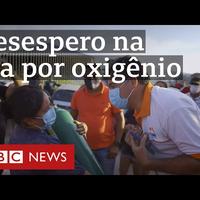Covid-19: a luta por oxigênio em Manaus
Sem velório, sem homenagens
Apenas a chuva e uma escavadeira
A pressa conduziu o enterro de Sergio Ricardo, de 34 anos
Mais uma vítima para a longa fila de sepulturas no cemitério de Manaus
Não é a primeira vez que a cidade vive essas cenas de desespero
Esta parte do cemitério é um lembrete das valas comuns abertas durante a primeira onda da covid-19
A única forma de dar conta do número de mortos
Os moradores da maior cidade da Amazônia se sentem, de novo, esquecidos
E a segunda onda chegou ainda pior
Depois de o oxigênio acabar nos hospitais, comovendo e chocando o mundo,
os estoques continuam escassos
Agora, as pessoas fazem filas nas fornecedoras locais do gás, na esperança de manter os
entes queridos vivos
Não precisa mais esse clima de desespero, ok?
Este representante de uma dessas empresas diz que não há motivo para desespero: cilindros
estão sendo distribuídos pela cidade
Mas Elke sente muito medo
Ela teve de deixar a mãe sozinha e sem oxigênio em casa para vir até aqui
Elke tem um único cilindro
Se a gente compra, a gente paga imposto. Aí na hora que nossos pais precisam, não tem
A gente tem que ficar se humilhando para eles viverem
Para viver a gente precisa se humilhar, para manter um ente querido vivendo
Não tem vaga para ela [no hospital]
Aí vai para lá, não tem oxigênio lá também. Eu vou deixar ela morrer lá?
Voluntários como Marcel entraram em ação para ajudar a levar oxigênio para quem precisa
Ele cuida de cinco pessoas, fazendo entregas diárias de oxigênio
Tem uma pessoa que eu conhecia, e ela morreu. E aí disse que faltou oxigênio
Eu falei: não, não faltou oxigênio, faltou falar comigo
Porque se falasse comigo não ia… [chora]
Porque eu os ajudaria, se eu soubesse. Eu teria feito chegar oxigênio lá
Meu amigo, de muitos anos... [...] morreu. E não tem necessidade, ele morreu sem necessidade, asfixiado
Médicos temem que a nova variante do vírus
descoberta em Manaus esteja colocando ainda mais pressão sobre hospitais já lotados
Esta área deste hospital tinha oito leitos
Era um quarto para cada paciente
Mas nos últimos dias os médicos tiveram que dobrar essa capacidade
Agora, são 16 camas
E eles precisam abrir espaço para ainda mais
Jaime é o paciente mais velho, com 77 anos
A sobrevivência dele hoje depende da sorte, diz seu filho, Fabio
O restante da ala está cheio de pessoas jovens
Esta mulher tem 23 anos
Perto dela, um homem na casa dos 30 anos
Isso vem chocando os médicos
A vacinação começou no país, mas o temor é que ela não esteja chegando a quem mais precisa
Mas antes de partirmos, uma boa notícia: Jaime reage aos estímulos da família pela
primeira vez desde que ficou doente
Um raro raio de esperança em meio a tempos sombrios

